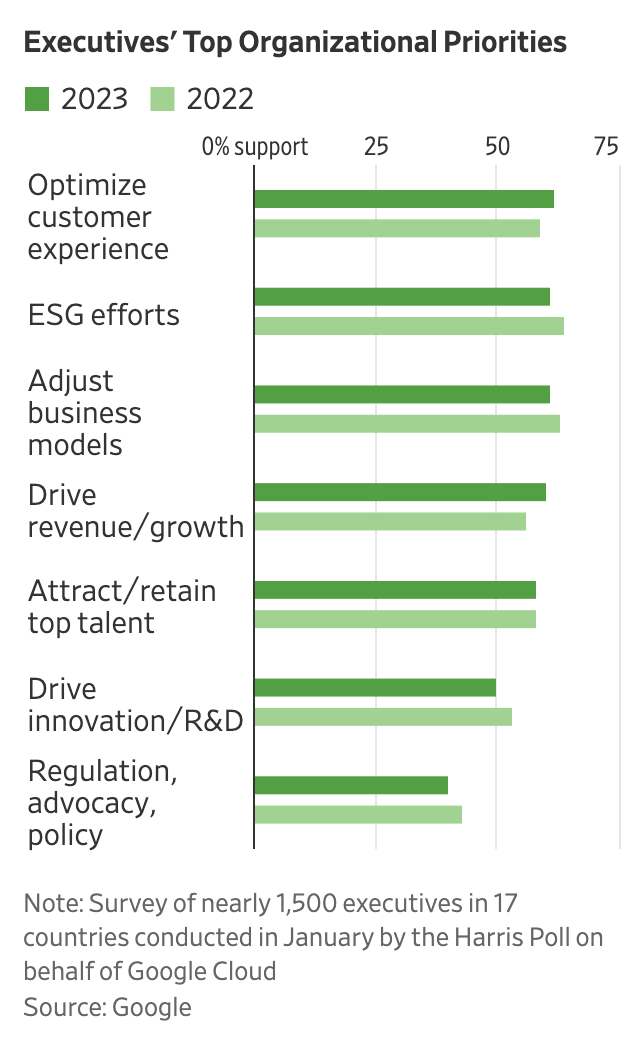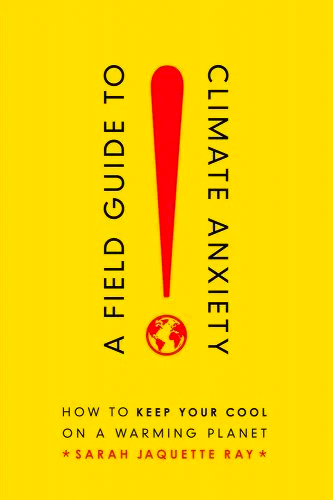Stuck on greenwashing, and a love letter to the climate generation
Earth Day is tomorrow; we cover executives' inability to make progress, how the economy could make it worse, and a psychological framework to get started.
The Next Big Think! will send you one number, two insights, and three links weekly to keep you ahead of societal shifts.

#FuturePerspective
[Are we]
“extinct yet. Who owns
the map. May l
look. Where is my
claim. Is my history
verifiable. Have I
included the memory
of the animals. The animals’
memories. Are they
still here.”
This is a stanza by poet Jorie Graham from her recent book 2040, which is a letter from the future imagining the difficult emotions that may surface in a climate-apocalyptic world. Futurists understand imagining what the future feels like, even for a minute, can help shift the priorities people make today. So while we don’t have data from the future, hopefully, imagining it will get our gears in motion.
Source: The Atlantic
2 Insights
#1. Executives Stuck On A Greenwashing Cycle
What:
Last week the WSJ covered our second annual sustainability study with Google Cloud, which surveyed nearly 1,500 executives across 17 countries and seven industries. The good news, executives are being honest, the bad news is they are stuck in a greenwashing cycle and fear the economy will slow down sustainability efforts.
Big shout out to Tim Osiecki, who led this research!!!
What the data tells us:
Read the entire report here, Google Cloud 2023 sustainability study.
Highlights below:
Caught in the greenwashing cycle, but don’t want to be there
72% say most organizations in their industry would be caught greenwashing if they were investigated thoroughly
59% of executives admitted to overstating — or inaccurately representing — their own sustainability activities
Executives don’t admit this lightly. Respondents overwhelmingly agree that greenwashing should have harsher consequences (83%) and that sustainability should be more than a PR stunt (88%)
Looking for a pathway forward.
72% of executives say want to advance sustainability efforts but don’t actually know how to go about doing it (7% increase YOY)
84% of executives believe their sustainability initiatives would be more effective if they had a better structure with clear accountability.
The big concern is the economy:
ESG efforts have fallen from the No. 1 organizational priority in 2022 to No. 3 in 2023
45% said the economy is negatively affecting their organizations’ sustainability efforts.
And compensation models have decreased, there was a 9% drop in organizations tying compensation to sustainability goals (now 43%)
What to think about:
At a time when the 2023 IPCC Report on Climate Change predicts Earth is likely to cross a critical threshold for global warming within the next decade, we cannot afford to wait on sustainability actions.
In fact, the NYTimes highlight IPCC’s one last piece of hope:
“There is still one last chance to shift course, the new report says. But it would require industrialized nations to join together immediately to slash greenhouse gases roughly in half by 2030 and then stop adding carbon dioxide to the atmosphere altogether by the early 2050s. If those two steps were taken, the world would have about a 50 percent chance of limiting warming to 1.5 degrees Celsius.”
As our Google Cloud client observes, “Essentially when times are getting hard, you get to see who’s serious about this agenda and those who are paying lip service or perhaps accidentally overstating their efforts,” said Justin Keeble, managing director of global sustainability at Google Cloud.
The problem is we can’t afford the implications of pausing actions on climate change to save ourselves from economic cycles. We get to make a choice, as humans, do we want to save ourselves? Because it’s a misnomer that we are saving the planet, as the planet will likely persist without us.
#2. A Love Letter To The Climate Generation
What:
After reading about the disastrous path of climate change, people can often feel paralyzed and without agency. Professor Sarah Jaquette Ray experienced this with her students, who many would cry out halfway through a climate lecture ‘What’s the point’, ‘We’re all doomed!’ Her response is a fantastic book, A Field To Climate Anxiety, which is really a love letter to the climate generation (e.g., Gen Z).
Note this book is not just for Gen Z, this book helps all people, especially those in leadership roles, get unstuck from eco-doom and build a propensity towards climate action and justice.
Read the book for yourself, but two big points to take away are:
She argues that the ‘ethos of sacrifice’ is unhealthy for activists doing the work and demotivating for the general public. Instead, she offers a reframe towards abundance over scarcity.
“Reframing environmentalism as a movement of abundance, connection, and well-being may help us rethink it as a politics of desire rather than a politics of individual sacrifice and denial.
It’s not “the end” of the world unless we resign ourselves to it
Reclaim this moment as the beginning”
- Sarah Jaquette Ray
She argues against empathy-leadership. Instead, she redirects the focus to compassionate leadership.
“Neuroscientists such as Tania Singer have shown that empathizing with someone in distress lights up parts of the brain associated with pain, while compression lights up parts of the brain associated with love. Empathy involves feeling another person’s suffering, as if you are experiencing the same things. Compassion is the ability to care about another's suffering.
…empathy dissolves our boundaries, compassion maintains them: it merely asks that we remain curious and understanding, and that we desire for others’ suffering to end.”
Don’t suffer with the people you are trying to serve, instead build a feedback loop of curiosity and compassion to foster relationships, common values, and long-term solidarity.
What the data tells us:
→ 🥺 More than two-thirds of Americans (67%) are somewhat or extremely anxious about the impact of climate change on the planet, and more than half (55%*) are somewhat or extremely anxious about the impact of climate change on their own mental health, American Psychiatric Association (APA)
What to think about:
One of Sarah Jaquette Ray’s final checkpoints is “Live in the world you want to save. Create time and space for wonder, leisure, and play.” This isn’t a get-out-of-jail-free card; it’s simply a statement that we must act intentionally while cultivating joy and abundance in our lives.
I recently participated in a 10-day simulation with the Urgent Optimist community, where we imagined what life would look like in 2033 if the world decided to use solar geoengineering to cool the earth, launching the world into a 10-year winter. At first, the simulation was incredibly depressing; what would we do without the sun for 10 years? But after ideating with a bunch of fascinating futurists, artists, and curious people, the future turned out brighter than anticipated, and that doesn’t just have to stay in a simulation.
3 Links
How empowering women and girls can help stop global warming (TED)
College student creates remarkable solar-powered car with nothing more than $500 and a pile of trash (The Cool Down)
Bonus: Check out our recent work with Empower Money Talks, which explores foundational perceptions about money, its biggest taboos, and Americans’ attitudes and behaviors around spending, saving, and investing.
Curiosity is contagious; if you like this newsletter, please share it!!
Penned by Libby Rodney and Abbey Lunney, founders of the Thought Leadership Group at The Harris Poll. To learn more about the Thought Leadership Practice, just contact one of us or find out more here.







